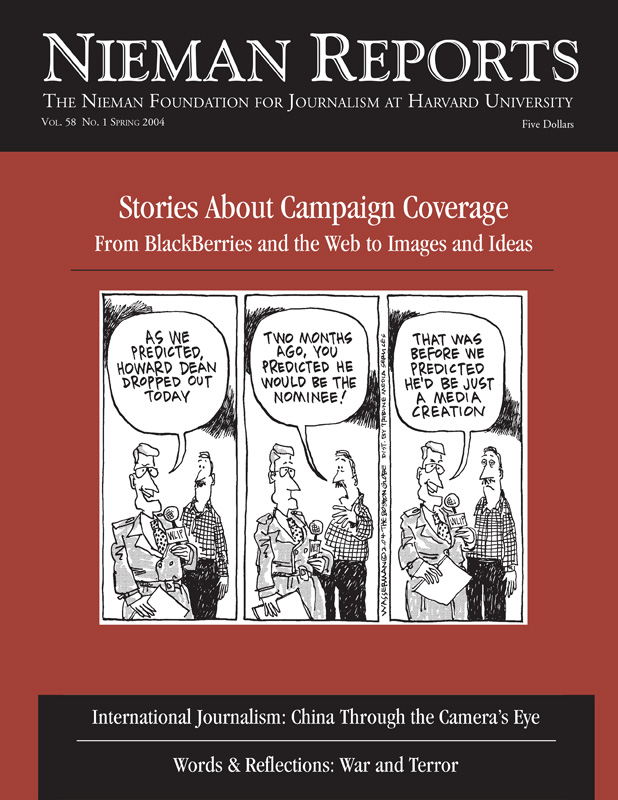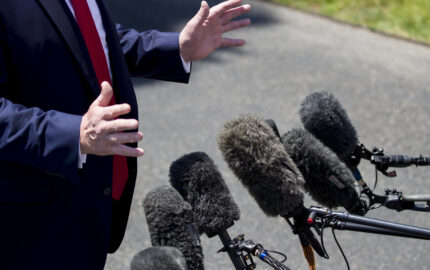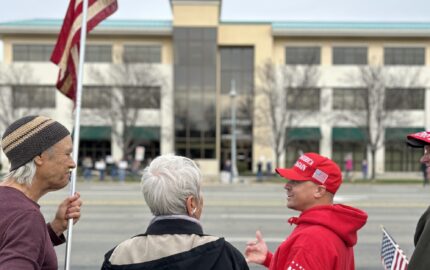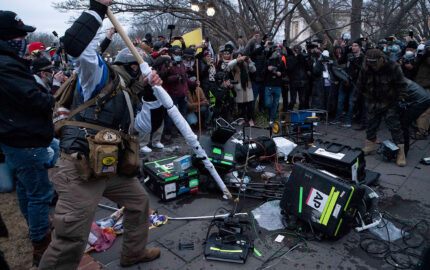Here’s what I’m learning: For those of us who like the sound of “Internet democracy,” who yearn for political and cultural renewal and “transformation,” the entrenched obstacle is not the old politics—it’s the old media. And the 2004 campaign has been about the power of that media all along.
If our politics has been about only one thing since September 11th, it’s been about the fight to rescue a Republic (“of the people, for the people, by the people”) from the temptations of Empire (of the foreign oil, for the corporate class, by the military). But if our politics is about more than one thing, then its next most important fight is about the voices in this democracy. Who gets to speak? Who gets to exercise more than a vote? Who is empowered to join the conversation that defines the problem and makes a priority list of responses? Who gets to feel the rush of public engagement?
The Internet invites a vast expansion of that expressive franchise. For the Internet-minded, the core issue in 2004 lies outside party lines or the standard list of left-right choices. As blogger Matt Stoller has written, “We are witnessing a nonpartisan war between those reactionaries who reject the widening spatial boundaries of politics and those visionaries who embrace them.” Not the least of the Internet’s charm is that it reminds us subliminally of a beloved myth—the open American frontier. It reconnects us with both the free speech and community of town meetings. It fires up again the self-reliant Emersonian dream of a liberated nation of vocal nonconformists. “The Internet, like the frontier, is about creation, growth and open spaces,” Stoller observes. For all those reasons, it is scaring some people and some interests half to death.
The Howard Dean campaign (much more than Dean himself) has come to stand for the possibility of an Internet democracy. From the beginning there was no separating the “political” and “media” tracks of the Dean campaign’s offensive. Didn’t he say early on that he was running for President because the alternative was to spend the rest of his life yelling at the TV set? Dean began his campaign with a bold exercise in definition—a job of critical journalism that big news organizations don’t perform these days. His defining thrust was against the war in Iraq, in which even before it began the traditional media were embedded. He sounded an antiwar alarm that the institutional media had muffled. Millions of people knew intuitively that his warning was wise; millions more know it now. In large dimensions and small (like his chippy defiance of “Meet the Press” moderator, Tim Russert), Dean’s campaign was a critique of the somnolent self-satisfaction that runs through our housecat press. And lots of people loved him for it.
My two-track verdict on the Dean campaign (through New Hampshire) is this. The politics of it is powerful—in a real sense triumphant. But its gamble on flying under the radar screen has proved dangerous, maybe terminal. A lot of wise heads in the political machine surrendered to Dean before Christmas, starting with the Al Gore endorsement, but the ugly old media machine rose up in January and very nearly destroyed him.
What happened to Dean in Iowa and New Hampshire was not as much about politics as it was about an assault by commercial media on the very idea of a self-willed, self-defining citizenry. Dean scares the institutional media out of their wits—not because of who he is or what he might do as President, but because of what he and Internet democracy say about them. And because Dean is their worst nightmare, they tried to crush him like a bug.
In September 2002, right about the time Dean was deciding to run, the nonpareil media critic Jon Katz wrote prophetically on the New York University Web page: “The flight of the young has become central for our understanding of what journalism is or needs to be. The young drive our new information culture. They invented and understand new forms of media—especially the Net and the Web. … They understand, too, the extraordinary power and meaning of interactivity and how it is redefining narrative and storytelling. … But journalism doesn’t get it, and has resisted the idea fiercely. Newspapers, newsmagazines and TV networks haven’t radically changed form or content in half a century, despite their aging audiences and growing competition from new media sources. They are allergic to interactivity. Increasingly, it appears they are incapable of it.”
Katz forecast it well. The Dean campaign is everything that contemporary journalism is not. Almost every touch from “big media” has been to lessen the Dean cause, to miss the point, or to find some personal excuse not to notice the Dean movement. Late in the fall, Samantha Shapiro’s cover story about the Dean campaign in The New York Times Magazine was, oddly enough, a high and a low. She captured well the brainy idealism that had drawn young computer geeks from all over the country to Dean’s headquarters in Burlington, Vermont, but she and the Times’s photographer left the strong impression that these were strange barefoot nerds who had concluded that a political campaign was a way to get laid.
In January, Time asked on its cover, “Who is the Real Howard Dean?” One week later Newsweek, on the eve of the Iowa caucuses, put “Doubts About Dean” on its cover. In Iowa, NBC Nightly News anchor Tom Brokaw asserted that he hadn’t been able to discover any Internet effect on voting. And on the night of the caucuses, Chicago Sun-Times columnist Bob Novak averred on CNN that there never was any such thing as a Dean movement. These might well be the famous last words from the dinosaurs.
Then came the infamous scream on caucus night in Des Moines. Here’s a test of news judgment: If you’d been in the frenzied hall with the Deaniacs that night and heard the candidate’s finale, would you have called home to report it? I saw a performance quite like it the night before in Iowa City and thought nothing of it. Yet there it was, on a ridiculous clip of party tape—a lot less embarrassing than, say, President George H.W. Bush upchucking in Japan—but in a few thousand repetitions a new character was launched—the “red-faced ranter,” accompanied now by somber doubts that he could be “presidential.”
The televised coverage of the New Hampshire primary returns was appalling. The big three networks stuck with prime-time entertainment, leaving viewers stuck with cable pundits—hyperactive, talking all about themselves and not about us or the country and using a stream of clichés. No end of trite phrases were turned to trivialize Dean and his effort. Though he’d had never been adequately credited with courage or forethought in crystallizing the dangers or doubts around Iraq, on the occasion of his second-place finish in the primary, he was being demeaned as a mere antiwar candidate, a latter day George McGovern. He was dissed continually as a caricature of “anger,” no matter that a large plurality of New Hampshire Democratic voters told the exit pollsters that they were angry, too. The Weekly Standard’s editor William Kristol made the only memorable point: that as long as Iraq remains a bleeding wound, John Kerry’s vote on the war leaves him wide open to Dean’s critique.
Days before the New Hampshire primary, author and syndicated columnist Richard Reeves made the shrewd observation on our “The Blogging of the President: 2004” broadcast that something fundamental had changed since John F. Kennedy and television exalted each other in 1960. Since then TV networks have discovered that American audiences are more interested in football than in politics. Sure enough, as the Democratic candidates headed out of New Hampshire, the media were conditioning us to understand that everything that happens in the Super Bowl is more important than almost anything that is at stake in the presidential campaign.
It’s a dismal moment in American media—just the right time to be developing a real conversation on the Web. The revolution will not be televised, but maybe it will be blogged.
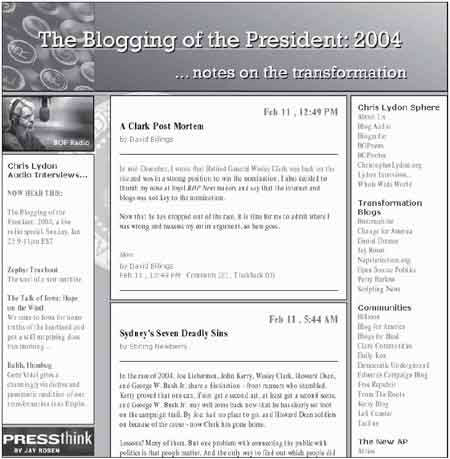
A page from Chris Lydon’s Web site.
Chris Lydon’s observations on the 2004 presidential campaign are found at www.christopherlydon.org, including “The Blogging of the President: 2004.” From the Washington bureau of The New York Times in the 1970’s, Lydon covered the presidential campaigns of George McGovern, Hubert Humphrey, Jimmy Carter, Ronald Reagan, among others.
If our politics has been about only one thing since September 11th, it’s been about the fight to rescue a Republic (“of the people, for the people, by the people”) from the temptations of Empire (of the foreign oil, for the corporate class, by the military). But if our politics is about more than one thing, then its next most important fight is about the voices in this democracy. Who gets to speak? Who gets to exercise more than a vote? Who is empowered to join the conversation that defines the problem and makes a priority list of responses? Who gets to feel the rush of public engagement?
The Internet invites a vast expansion of that expressive franchise. For the Internet-minded, the core issue in 2004 lies outside party lines or the standard list of left-right choices. As blogger Matt Stoller has written, “We are witnessing a nonpartisan war between those reactionaries who reject the widening spatial boundaries of politics and those visionaries who embrace them.” Not the least of the Internet’s charm is that it reminds us subliminally of a beloved myth—the open American frontier. It reconnects us with both the free speech and community of town meetings. It fires up again the self-reliant Emersonian dream of a liberated nation of vocal nonconformists. “The Internet, like the frontier, is about creation, growth and open spaces,” Stoller observes. For all those reasons, it is scaring some people and some interests half to death.
The Howard Dean campaign (much more than Dean himself) has come to stand for the possibility of an Internet democracy. From the beginning there was no separating the “political” and “media” tracks of the Dean campaign’s offensive. Didn’t he say early on that he was running for President because the alternative was to spend the rest of his life yelling at the TV set? Dean began his campaign with a bold exercise in definition—a job of critical journalism that big news organizations don’t perform these days. His defining thrust was against the war in Iraq, in which even before it began the traditional media were embedded. He sounded an antiwar alarm that the institutional media had muffled. Millions of people knew intuitively that his warning was wise; millions more know it now. In large dimensions and small (like his chippy defiance of “Meet the Press” moderator, Tim Russert), Dean’s campaign was a critique of the somnolent self-satisfaction that runs through our housecat press. And lots of people loved him for it.
My two-track verdict on the Dean campaign (through New Hampshire) is this. The politics of it is powerful—in a real sense triumphant. But its gamble on flying under the radar screen has proved dangerous, maybe terminal. A lot of wise heads in the political machine surrendered to Dean before Christmas, starting with the Al Gore endorsement, but the ugly old media machine rose up in January and very nearly destroyed him.
What happened to Dean in Iowa and New Hampshire was not as much about politics as it was about an assault by commercial media on the very idea of a self-willed, self-defining citizenry. Dean scares the institutional media out of their wits—not because of who he is or what he might do as President, but because of what he and Internet democracy say about them. And because Dean is their worst nightmare, they tried to crush him like a bug.
In September 2002, right about the time Dean was deciding to run, the nonpareil media critic Jon Katz wrote prophetically on the New York University Web page: “The flight of the young has become central for our understanding of what journalism is or needs to be. The young drive our new information culture. They invented and understand new forms of media—especially the Net and the Web. … They understand, too, the extraordinary power and meaning of interactivity and how it is redefining narrative and storytelling. … But journalism doesn’t get it, and has resisted the idea fiercely. Newspapers, newsmagazines and TV networks haven’t radically changed form or content in half a century, despite their aging audiences and growing competition from new media sources. They are allergic to interactivity. Increasingly, it appears they are incapable of it.”
Katz forecast it well. The Dean campaign is everything that contemporary journalism is not. Almost every touch from “big media” has been to lessen the Dean cause, to miss the point, or to find some personal excuse not to notice the Dean movement. Late in the fall, Samantha Shapiro’s cover story about the Dean campaign in The New York Times Magazine was, oddly enough, a high and a low. She captured well the brainy idealism that had drawn young computer geeks from all over the country to Dean’s headquarters in Burlington, Vermont, but she and the Times’s photographer left the strong impression that these were strange barefoot nerds who had concluded that a political campaign was a way to get laid.
In January, Time asked on its cover, “Who is the Real Howard Dean?” One week later Newsweek, on the eve of the Iowa caucuses, put “Doubts About Dean” on its cover. In Iowa, NBC Nightly News anchor Tom Brokaw asserted that he hadn’t been able to discover any Internet effect on voting. And on the night of the caucuses, Chicago Sun-Times columnist Bob Novak averred on CNN that there never was any such thing as a Dean movement. These might well be the famous last words from the dinosaurs.
Then came the infamous scream on caucus night in Des Moines. Here’s a test of news judgment: If you’d been in the frenzied hall with the Deaniacs that night and heard the candidate’s finale, would you have called home to report it? I saw a performance quite like it the night before in Iowa City and thought nothing of it. Yet there it was, on a ridiculous clip of party tape—a lot less embarrassing than, say, President George H.W. Bush upchucking in Japan—but in a few thousand repetitions a new character was launched—the “red-faced ranter,” accompanied now by somber doubts that he could be “presidential.”
The televised coverage of the New Hampshire primary returns was appalling. The big three networks stuck with prime-time entertainment, leaving viewers stuck with cable pundits—hyperactive, talking all about themselves and not about us or the country and using a stream of clichés. No end of trite phrases were turned to trivialize Dean and his effort. Though he’d had never been adequately credited with courage or forethought in crystallizing the dangers or doubts around Iraq, on the occasion of his second-place finish in the primary, he was being demeaned as a mere antiwar candidate, a latter day George McGovern. He was dissed continually as a caricature of “anger,” no matter that a large plurality of New Hampshire Democratic voters told the exit pollsters that they were angry, too. The Weekly Standard’s editor William Kristol made the only memorable point: that as long as Iraq remains a bleeding wound, John Kerry’s vote on the war leaves him wide open to Dean’s critique.
Days before the New Hampshire primary, author and syndicated columnist Richard Reeves made the shrewd observation on our “The Blogging of the President: 2004” broadcast that something fundamental had changed since John F. Kennedy and television exalted each other in 1960. Since then TV networks have discovered that American audiences are more interested in football than in politics. Sure enough, as the Democratic candidates headed out of New Hampshire, the media were conditioning us to understand that everything that happens in the Super Bowl is more important than almost anything that is at stake in the presidential campaign.
It’s a dismal moment in American media—just the right time to be developing a real conversation on the Web. The revolution will not be televised, but maybe it will be blogged.

A page from Chris Lydon’s Web site.
Chris Lydon’s observations on the 2004 presidential campaign are found at www.christopherlydon.org, including “The Blogging of the President: 2004.” From the Washington bureau of The New York Times in the 1970’s, Lydon covered the presidential campaigns of George McGovern, Hubert Humphrey, Jimmy Carter, Ronald Reagan, among others.
